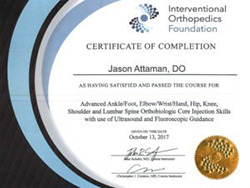Up to a third of whiplash patients report feeling pain for ten years or more after their accidents. While non-interventional treatments like chiropractic care can be helpful for managing whiplash pain, in many cases the pain will persist without a more rigorous treatment approach. That may mean moving to nerve blocks, but those aren’t always effective.
Radiofrequency ablation is an innovative and non-invasive procedure that can treat whiplash pain. Examples of whiplash pain include routine stiffness or pain in the neck, facial pain, and headaches.
What is radiofrequency ablation for whiplash pain?
Radiofrequency ablation uses targeted radio waves that generate enough heat to kill affected nerve tissue. The result is long-term, even permanent, pain relief. Not only does this essentially offer a cure for whiplash but can also be used to treat other conditions, like complex regional pain syndrome.
During the procedure we place a miniscule electrode into an equally small needle. This allows us to send a radiofrequency current to the spot for up to 90 seconds.
The procedure brings long-term pain relief, usually for 1 to 3 years. Some patients find the pain doesn’t return even after the three year period is up. If it does, we may perform a new procedure to offer long-term pain relief.
Does radiofrequency ablation hurt?
We’ll give you a mild, generalized anesthetic before the process begins, but you won’t be knocked out entirely. We’ll need your feedback to place the electrodes precisely. We’ll also use X-rays to find the exact spot we need to target.
There may be some discomfort during and after the procedure, usually swelling and bruising around the injection site. We’ll give you pain medication to manage those days. You can also relieve the pain with cold packs. This additional pain can last up to three weeks, but once the site heals you should experience permanent pain relief.
Is radiofrequency ablation an outpatient procedure?
Yes. We’ll do it here in our office.
You’ll be asked to take 24 hours off work to rest, and to avoid driving during that time. Make sure you have a trusted family member on hand to drive you to and from the office.
We’ll ask you to stay for an hour or two after the procedure so we can monitor your condition. Radiofrequency ablation is a low-risk procedure, but some patients experience allergic reactions.
Does insurance cover radiofrequency ablation?
It depends on your insurance policy. Insurance companies have become more accepting of radiofrequency ablation as time has passed, and many policies have chosen to offer some form of coverage, including Medicare. Kaiser Permanente is quite friendly to radiofrequency ablation.
We can help you check your insurance coverage and evaluate your payment options. We’ll do everything we can to ensure that money does not stand between you and your ability to live a pain-free life.
Contact us to discuss treatment options for your whiplash pain
Contact our office to set up your appointment today. We’ll start with the least-aggressive treatments and move on to the one that ultimately works. We’ll help you determine if radiofrequency ablation is right for you, because we’re committed to helping you cure your whiplash pain for good.
At our office you’ll meet with Dr. Attaman every single time. That means you’ll always have a board-certified physician evaluating whether any given treatment option is right for you. You can feel confident knowing we’ll work hard to end your pain.
